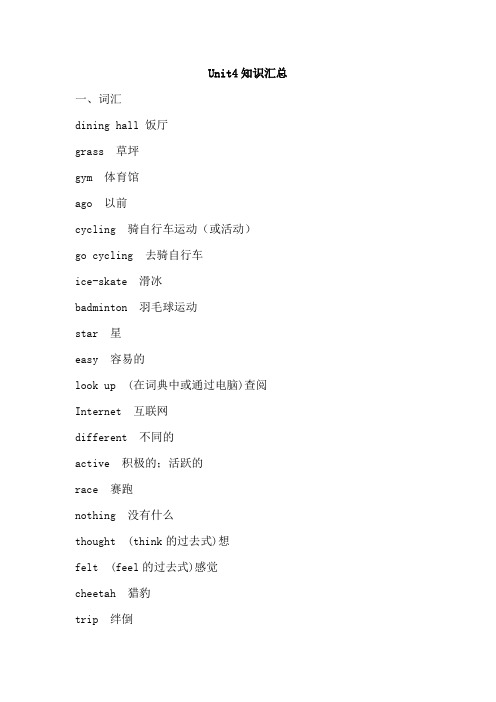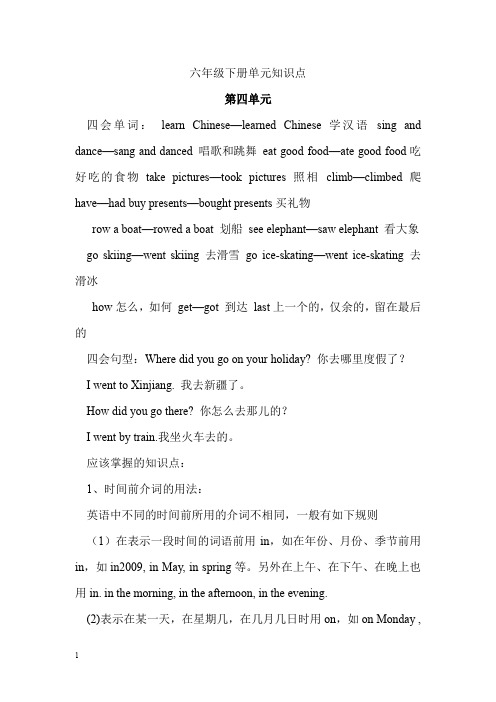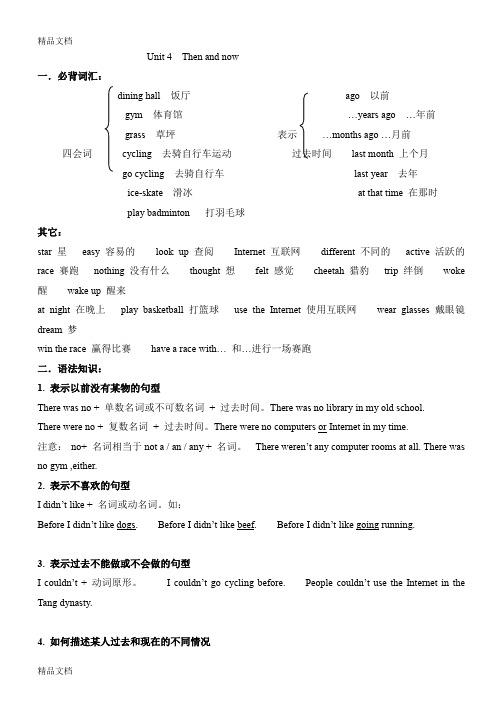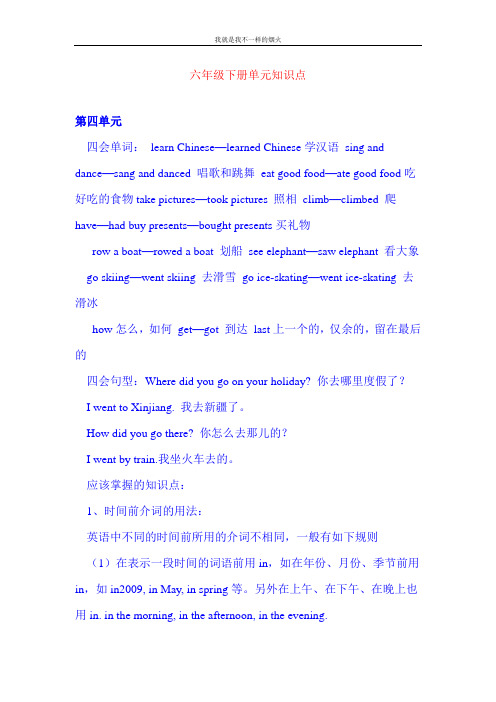最新小学PEP人教版英语六年级下册Unit 4单元重点知识1
- 格式:doc
- 大小:31.50 KB
- 文档页数:3

Unit4知识汇总一、词汇dining hall 饭厅grass 草坪gym 体育馆ago 以前cycling 骑自行车运动(或活动)go cycling 去骑自行车ice-skate 滑冰badminton 羽毛球运动star 星easy 容易的look up (在词典中或通过电脑)查阅Internet 互联网different 不同的active 积极的;活跃的race 赛跑nothing 没有什么thought (think的过去式)想felt (feel的过去式)感觉cheetah 猎豹trip 绊倒woke (wake的过去式)醒dream 梦二、句子1. Our school was small! 我们的学校(过去)很小!2. We didn t have a library, and there weren t any computer rooms at all.更多内容请关注微信公众号:xscyy100我们(过去)没有图书馆,而且根本没有电脑室。
3. There was no library in my old school. 我以前的学校里没有图书馆。
4. Tell us about your school, please. 请给我们讲讲您的学校吧。
5. -- Could you see stars at night? 您能在晚上看见星星吗? -- Yes, I liked the stars. 是的,我喜欢星星。
6. One day I m going to visit the moon. 有一天我将要参观月球。
7. -- How do you know that? 你怎么知道的?-- Easy, I looked it up on the Internet. 很容易,我在互联网上查的。
8. Before, I was quiet. Now, I m very active in class.以前我很安静。


六年级下册单元知识点第四单元四会单词:learn Chinese—learned Chinese学汉语sing and dance—sang and danced 唱歌和跳舞eat good food—ate good food吃好吃的食物take pictures—took pictures 照相climb—climbed 爬have—had buy presents—bought presents买礼物row a boat—rowed a boat 划船see elephant—saw elephant 看大象go skiing—went skiing 去滑雪go ice-skating—went ice-skating 去滑冰how怎么,如何get—got 到达last上一个的,仅余的,留在最后的四会句型:Where did you go on your holiday? 你去哪里度假了?I went to Xinjiang. 我去新疆了。
How did you go there? 你怎么去那儿的?I went by train.我坐火车去的。
应该掌握的知识点:1、时间前介词的用法:英语中不同的时间前所用的介词不相同,一般有如下规则(1)在表示一段时间的词语前用in,如在年份、月份、季节前用in,如in2009, in May, in spring等。
另外在上午、在下午、在晚上也用in. in the morning, in the afternoon, in the evening.(2)表示在某一天,在星期几,在几月几日时用on,如on Monday ,on May 1st. 另外还有on Tuesday morning.(3) 表示具体的时刻,在…几点钟时用at。
如at 6 o’clock. at 7:20.2、英语书信的书写格式;(1)称呼:指导对收信人的称呼。
一般从信纸的左边顶格写起。

Unit 4 Then and now一.必背词汇:dining hall 饭厅ago 以前gym 体育馆…years ago …年前grass 草坪表示…months ago …月前四会词cycling 去骑自行车运动过去时间last month 上个月go cycling 去骑自行车last year 去年ice-skate 滑冰at that time 在那时play badminton 打羽毛球其它:star星easy 容易的look up 查阅Internet 互联网different 不同的active 活跃的race赛跑nothing 没有什么thought 想felt 感觉cheetah 猎豹trip 绊倒woke 醒wake up 醒来at night 在晚上play basketball 打篮球use the Internet 使用互联网wear glasses 戴眼镜dream 梦win the race 赢得比赛have a race with…和…进行一场赛跑二.语法知识:1. 表示以前没有某物的句型There was no + 单数名词或不可数名词+ 过去时间。
There was no library in my old school.There were no + 复数名词+ 过去时间。
There were no computers or Internet in my time.注意:no+ 名词相当于not a / an / any + 名词。
There weren’t any computer rooms at all. There was no gym ,either.2. 表示不喜欢的句型I didn’t like + 名词或动名词。
如:Before I didn’t like dogs. Before I didn’t like beef. Before I didn’t like going running.3. 表示过去不能做或不会做的句型I couldn’t + 动词原形。

人教版六年级英语下册第四单元Unit4知
识总结
本文对人教版六年级英语下册第四单元的知识进行总结。
第四单元的主题是“Jobs”。
通过本单元的研究,学生将研究与不同的职业相关的词汇和句子。
以下是本单元的主要内容和重点:
1. 职业
本单元重点介绍了一些常见的职业,如医生、警察、农民、教师等。
学生将研究这些职业的英语表达,了解他们的职责和工作。
2. 职业相关的动词
学生将研究一些与职业相关的动词,如“teach”(教)、“heal”(医治)、“drive”(开车)等。
这些动词能够帮助学生描述职业人员的工作内容。
3. 职业描述
学生将研究如何用英语描述不同职业的特点和工作内容。
他们将研究使用形容词和句子来描述职业人员的外貌、特长、兴趣等,以及他们在工作中所做的事情。
4. 日常交流
学生将通过本单元的研究,培养日常交流的能力。
他们将学会用英语表达自己的职业理想、询问他人的职业以及交流关于职业的信息。
本单元的研究将帮助学生扩展他们的英语词汇量,提升他们的语言表达能力,并了解不同职业的工作内容。
通过练和运用所学的知识,学生将能够更好地交流和理解与职业相关的内容。

六年级下册单元知识点第四单元四会单词:learn Chinese—learned Chinese学汉语sing and dance—sang and danced 唱歌和跳舞eat good food—ate good food吃好吃的食物take pictures—took pictures 照相climb—climbed 爬have—had buy presents—bought presents买礼物row a boat—rowed a boat 划船see elephant—saw elephant 看大象go skiing—went skiing 去滑雪go ice-skating—went ice-skating 去滑冰how怎么,如何get—got 到达last上一个的,仅余的,留在最后的四会句型:Where did you go on your holiday? 你去哪里度假了?I went to Xinjiang. 我去新疆了。
How did you go there? 你怎么去那儿的?I went by train.我坐火车去的。
应该掌握的知识点:1、时间前介词的用法:英语中不同的时间前所用的介词不相同,一般有如下规则(1)在表示一段时间的词语前用in,如在年份、月份、季节前用in,如in2009, in May, in spring等。
另外在上午、在下午、在晚上也用in. in the morning, in the afternoon, in the evening.(2)表示在某一天,在星期几,在几月几日时用on,如on Monday , on May 1st. 另外还有on Tuesday morning.(3) 表示具体的时刻,在…几点钟时用at。
如at 6 o’clock. at 7:20.2、英语书信的书写格式;(1)称呼:指导对收信人的称呼。
一般从信纸的左边顶格写起。
人教版pep六下英语第四单元重点知识Key points of Unit 4 in People's Education Press (PEP) Grade 6 English1. Vocabulary- Family members: grandfather, grandmother, uncle, aunt, cousin, nephew, niece- Actions: meet, introduce, visit, chat, carry, help, play2. Grammar- Present Continuous Tense: "I am visiting my grandparents." "She is chatting with her aunt."- Possessive adjectives: my, your, his, her, our, their- Prepositions of place: on, in, under, next to, between3. Sentences structures- "Meet my grandfather. This is my grandmother." (Introducing family members)- "Who is that girl? She is my cousin." (Identifying family members)- "I am visiting my aunt this weekend." (Talking about future plans)4. Reading and Comprehension- Reading passages about family activities and relationships- Questions and exercises related to the text- Practice with answering questions in complete sentences5. Writing- Describing family members (e.g. My grandfather has white hair and a friendly smile. He likes to tell stories about his youth.)- Writing short paragraphs about family gatherings or special occasions- Composing letters or emails to family members6. Listening and Speaking- Listening to dialogues about family members meeting and talking- Role-playing exercises for introducing family members- Asking and answering questions about family relationships7. Culture and Etiquette- Understanding the importance of family in different cultures- Learning to address family members respectfully (e.g. using titles like "uncle" or "aunt")- Discussing the values of family support and loveOverall, Unit 4 in the PEP Grade 6 English curriculum focuses on vocabulary related to family members, grammar structures like the Present Continuous Tense and Possessive adjectives, reading and writing exercises about family relationships, and listening and speaking activities to practice communication skills. By mastering these key points, students will be able to talk about their families confidently and fluently in English.。
人教PEP版英语六年级下册各单元知识点Unit 1 How tall are you ?一.必背单词(形容词的比较级)①一般形容词→词尾+ertall —— taller 高的----更高的 short —— shorter 矮的/短的----更矮的/更短的long —— longer 长的----更长的 strong—— stronger 强壮的----更强壮的old —— older 老的/旧的----更老的/更旧的 young—— younger 年轻的----更年轻的 small —— small 小的----更小的 low—— lower 低地----更低地smart——smarter 聪明的 ----更聪明的②以e结尾的形容词→词尾+rlarge —— larger 大的----更大的 late —— later 晚的----更晚的simple —— simpler 简单的----更简单的 safe —— safer 舒服的----更舒服的③以重读闭音节结尾,辅+元+辅→双写最后一个辅音字母+erbig——bigger 大的——更大的 thin——thinner 瘦的——更瘦的fat——fatter 胖的——更胖的 sad ——sadder难过的——更难过的hot——hotter 热的——更热的 wet——wetter 潮湿的——更潮湿的④辅音字母+y 结尾→改 y 为 i +erhappy——happier 开心的——更开心的 heavy——heavier 重的——更重的funny——funnier 滑稽的——更滑稽的 angry——angrier 生气的----更生气的sunny——sunnier 生气的----更生气的 windy——windier 有风的的----更有风的busy——busier 忙的----更忙的 early——earlier 提早的----更早的dinosaur 恐龙 hall 大厅 than 比 both 两个都 meter 米kilogram 千克;公斤size 号码 feet 脚 wear 穿 countryside 乡村 shadow 影子;阴影become 变成;开始变得二.重点句型⑴ 问年龄,身高,体重等How old are you? How tall are you? How heavyare you?--- I’m _______ (years old). --- I’m ______metres tall. ---- I’m ______ kilograms .⑵ 问物品的情况:① How large is your room? 你的房间有多大?It’s ______ m (square meters.) 有___平方米。
人教PEP版小学英语六年级下册第四单元知识点梳理(Unit4Then and now)附复习要点第四单元Unit4Then and now知识点归纳一.必背词汇:dining hall饭厅ago以前gym体育馆…years ago…年前grass草坪表示…months ago…月前四会词cycling去骑自行车运动过去时间last month上个月go cycling去骑自行车last year去年ice-skate滑冰at that time在那时play badminton打羽毛球其它单词归纳:dining hall饭厅grass草坪gym体育馆ago以前cycling骑自行车运动ice—skate滑冰badminton羽毛球运动star(stars)星easy容易的Internet互联网different(same)不同的(相同的)active积极活跃的;race赛跑nothing没有什么think—thought想feel—felt感觉cheetah猎豹trip绊倒wake—woke醒dream梦star星easy容易的look up查阅Internet互联网different不同的active活跃的race赛跑nothing没有什么thought想felt感觉cheetah猎豹trip绊倒woke醒wake up醒来短语归纳:go cycling去骑自行车play badminton打羽毛球look up查阅last month/year上月/去年at night在晚上play basketball打篮球use the Internet使用互联网wear glasses戴眼镜dream梦win the race赢得比赛have a race with…和…进行一场赛跑一、句子归纳:1、There was no library in my old school.我以前的学校里没有图书馆。
人教版pep六下英语第四单元重点知识全文共10篇示例,供读者参考篇1Hello everyone! Today I'm going to talk about the key points of Unit 4 in the sixth grade English textbook.In Unit 4, we learn about daily routines, time expressions, and the verb "like". It's a super fun unit because we get to talk about our everyday activities and the things we enjoy doing.First, let's talk about daily routines. We learn how to talk about what we do every day, like brushing our teeth, eating breakfast, and going to school. We also learn time expressions like "in the morning", "in the afternoon", and "at night" to help us talk about when we do these activities.Next, we learn how to use the verb "like". We can use "like" to talk about the things we enjoy or prefer. For example, "I like playing soccer" or "She likes watching movies". It's easy to use and helps us express our interests.We also practice speaking and listening in this unit. We learn how to ask and answer questions about daily routines andhobbies. It's important to practice speaking so we can communicate in English with our friends and classmates.Overall, Unit 4 is a really cool unit that helps us talk about our daily activities and interests. Remember to review the key points and practice speaking English every day. English is fun and easy to learn if we practice regularly. Let's keep learning and improving our English together!That's all for now. Thank you for listening! Bye-bye!篇2Hi guys! Today, I'm going to talk about the key knowledge in Unit 4 of our English textbook. It's super duper important to understand these points, so let's get started!Firstly, we need to know about different kinds of weather. There are sunny, rainy, cloudy, windy, snowy, and stormy days. Each type of weather has its own characteristics, like the sun shining brightly on a sunny day or the rain falling heavily on a rainy day.Next, we should learn some useful phrases for describing the weather. For example, we can say "It's sunny today" or "It'sraining cats and dogs." These phrases can help us communicate with others about the weather easily.Thirdly, we need to be able to talk about our favorite seasons. We can express our preferences by saying things like "I love summer because I can go swimming" or "I enjoy winter because I can play in the snow."In addition, it's important to know how to give weather forecasts. We can use phrases like "It will be sunny tomorrow" or "There will be a thunderstorm in the evening." This way, we can help others prepare for the weather ahead.Lastly, we should practice using question words to ask about the weather. We can ask "What's the weather like today?" or "When will it snow?" These questions can help us gather information about the weather around us.Remember to review these key points frequently so you can become an expert in talking about the weather. Keep practicing and have fun learning English! See you next time! Bye-bye!篇3Hello everyone! Today I’m going to talk about the important knowledge in Unit 4 of our English textbook. Let’s get started!In this unit, we learn about different activities we can do in our free time. The key vocabulary includes "play the guitar", "paint", "play chess", "do kung fu", "plant flowers", "ride a bike", and so on. It’s important to remember these words so we can talk about our hobbies and interests with others.We also learn about the present continuous tense, which is used to talk about actions happening now. For example, “I am painting a picture” or “She is playing basketball”. It’s fun to practice using this tense and create our own sentences.Another important point in this unit is the use of prepositions of pl ace, such as “in”, “on”, “under”, “next to”, and “behind”. These words help us describe where things are located. For example, “The cat is on the table” or “The flowers are next to the window”.We also practice asking and answering questions about acti vities using “What are you doing?” and “I am …”. It’s a good way to start conversations and learn more about our friends’ hobbies.Overall, Unit 4 is all about having fun and talking about our favorite activities. Remember to study the vocabulary, practice the grammar, and enjoy learning English! Let’s keep working hard and improving our language skills together. Good luck!篇4Hello everyone! Today I am going to talk about the key points of Unit 4 in our English textbook. Are you ready? Let's get started!In Unit 4, we learn a lot of important things about animals and their habitats. We study different kinds of animals like elephants, tigers, pandas, and so on. We also learn about the environments they live in, such as forests, deserts, and oceans.One of the key points in this unit is learning the names of different animals and their habitats. For example, we need to know that elephants live in the forest, tigers live in the jungle, and pandas live in the bamboo forest. It's important to remember these facts so that we can understand more about animals.Another key point is learning how to describe animals and their habitats. We can use adjectives to talk about animals, such as big, small, fast, slow, and so on. We can also use prepositionsto describe where animals live, such as in, on, under, and so forth.Lastly, we learn about the importance of protecting animals and their habitats. We should all do our part to take care of the environment and make sure that animals have a safe place to live.I hope you have enjoyed learning about the key points of Unit 4 with me. Let's continue to study hard and become experts in English! Thank you for listening!篇5Hey guys! Today, I'm gonna tell you all about the key points in the fourth unit of our English book. Are you ready? Let's go!First, we learned about different places in a city. Like supermarket, restaurant, cinema, park, hospital, and so on. It's important to know these places in English so we can talk about where we want to go or what we want to do.Next, we practiced asking and giving directions. We learned how to use words like "turn left", "turn right", "go straight", and "take the first/second/third/fourth turn". It's super important toknow how to give directions so we don't get lost when we're out and about.Then, we learned how to talk about transportation. We learned the names of different vehicles like bus, car, bike, train, and so on. We also learned how to ask and answer questions about how we get to places. Like "How do you go to school?" or "I go to the cinema by bus".Finally, we practiced using the present continuous tense to talk about what people are doing right now. We learned how to say things like "He is watching TV" or "She is reading a book". It's fun to talk about what people are doing at the moment!So, that's it for the key points in the fourth unit of our English book. I hope you guys found it helpful and remember to keep practicing your English every day. Bye-bye!篇6Hey guys, today I want to talk about the key points of Unit 4 in our PE6 textbook. Are you ready? Let's go!In this unit, we learned about different kinds of animals and their habitats. We also learned how to describe animals and talkabout their characteristics. It's so cool to learn about all these amazing creatures!One of the important things we learned in this unit is how to use the words "live" and "alive" correctly. Remember, we use "live" when we're talking about where an animal lives, like "Penguins live in cold places." And we use "alive" when we're talking about whether an animal is dead or not, like "The fish is still alive."We also learned about comparative and superlative adjectives in this unit. It's fun to compare animals and see which one is bigger, smaller, faster, or slower. Remember to use "more" before the adjective to compare two things, and "the most" before the adjective to compare more than two things.Another important thing we learned is how to ask and answer questions about animals. We can ask questions like "What does it look like?" or "Where does it live?" It's so interesting to learn more about different animals!I hope you guys enjoyed learning about animals in this unit. Remember to review the key points and practice using them in your daily conversations. Keep up the good work, and let's learn more together in the next unit!篇7Title: Let's Learn about the Key Points in Unit Four of PEP EnglishHey guys, today I'm going to tell you all about the key points in Unit Four of our PEP English book. So let's get started!First of all, in this unit, we will learn about seasons and weather. We will learn the names of the four seasons: spring, summer, autumn, and winter. We will also learn about different weather conditions like sunny, rainy, cloudy, and snowy.Next, we will learn how to ask and answer questions about the weather. For example, "What's the weather like today?" and "It's sunny today." It's important to know how to talk about the weather because it affects what we wear and what activities we can do.In this unit, we will also learn how to tell the time. We will learn how to say the hours and minutes in English, and how to ask for the time. It's important to know how to tell the time so we can be on time for school, activities, and appointments.Another important topic in this unit is about daily activities. We will learn how to talk about our daily routines and the thingswe do every day. For example, "I brush my teeth in the morning" or "I have dinner at 6 o'clock."Lastly, we will learn some new words and phrases related to the topics in this unit. Make sure to review the vocabulary words so you can use them in your conversations and writing.So that's all for the key points in Unit Four of PEP English. I hope this helps you all understand the important topics we will be learning. Keep practicing and have fun learning English! See you next time! Bye-bye!篇8Hey guys, today I'm gonna tell you all about the key points in Unit 4 of our English textbook. Let's dive in!First off, we've got the topic of "How do you go to school?" We learn all about different modes of transportation like walking, riding a bike, taking a bus, and so on. It's super important to know how to talk about how we get to places in English.Next up, we've got the question "Where is my bag?" This unit teaches us all about prepositions of place, like "on", "in", "under", and more. It's so cool to learn how to describe where things are located!Then, we learn about "In the playground". We get to talk about different activities we can do outdoors, like playing football, jumping rope, and flying kites. It's so fun to learn all these new words!And finally, we have "My dream house". In this part, we talk about different rooms in a house and what furniture is in each room. It's awesome to imagine what our dream house might look like!So there you have it, guys! Those are the key points in Unit 4. Make sure to study hard and practice speaking English as much as you can. Keep up the good work, everyone! Let's learn English together!篇9Hey guys, today I am going to talk about the key points in Unit 4 of our English textbook. There are some important things we need to remember, so let's dive right in!First, let's talk about the new words we learned in this unit. We learned words like bakery, supermarket, street, cinema, park, bus station, hospital, and post office. It's important to remember these words because we will be using them a lot in our conversations.Next, we learned how to ask for and give directions. For example, if you want to ask where the supermarket is, you can say "Excuse me, where is the supermarket?" And if someone asks you where the park is, you can say "Go straight and turn left at the second street." It's important to practice these phrases so we can help each other find our way around.In this unit, we also learned about the different places in a city. We learned about places like the bakery, the supermarket, the cinema, the park, the hospital, the bus station, and the post office. It's important to know these places so we can talk about where we want to go and how to get there.Overall, Unit 4 has been really fun and interesting. We learned a lot of new words and phrases that will help us communicate better in English. I can't wait to keep learning and exploring more about the world around us. Thanks for listening, and I hope you have a great day!篇10Hello everyone, I am excited to share with you all the key points of Unit 4 in our English textbook! In this unit, we will learn all about daily routines, telling time, and different activities we do throughout the day. Let's dive in and explore together!First, we will start by learning how to talk about our daily routines. We will learn how to say things like "I get up at 7o'clock" or "I brush my teeth before breakfast". It's important to know the sequence of activities we do every day and how to express it in English.Next, we will learn how to tell time in English. We will learn how to say the different hours and minutes, and how to ask and answer questions about time. For example, "What time is it?" or "It's half past three". It's fun to practice telling time with our friends and classmates!We will also learn about different activities we do throughout the day, such as eating breakfast, going to school, playing sports, and having dinner. It's important to know the vocabulary for these activities and how to use them in sentences.In addition, we will learn about adverbs of frequency, such as always, usually, sometimes, and never. These adverbs help us talk about how often we do certain activities in our daily routines. For example, "I always do my homework after school" or "I never eat vegetables".By the end of this unit, we will be able to have conversations about our daily routines, tell time, talk about different activities,and use adverbs of frequency in our sentences. I can't wait to learn and practice these new skills with all of you!That's all for now, see you in the next English class! Let's keep learning and having fun together!。
六年级下册单元知识点
第四单元
四会单词: learn Chinese—learned Chinese学汉语 sing and dance—sang and danced 唱歌和跳舞 eat good food—ate good food吃好吃的食物take pictures—took pictures 照相climb—climbed 爬 have—had buy presents—bought presents买礼物
row a boat—rowed a boat 划船 see elephant—saw elephant 看大象
go skiing—went skiing 去滑雪 go ice-skating—went ice-skating 去滑冰
how怎么,如何 get—got 到达 last上一个的,仅余的,留在最后的
四会句型:Where did you go on your holiday? 你去哪里度假了?
I went to Xinjiang. 我去新疆了。
How did you go there? 你怎么去那儿的?
I went by train.我坐火车去的。
应该掌握的知识点:
1、时间前介词的用法:
英语中不同的时间前所用的介词不相同,一般有如下规则
(1)在表示一段时间的词语前用in,如在年份、月份、季节前用in,如in2009, in May, in spring 等。
另外在上午、在下午、在晚上也用in. in the morning, in the afternoon, in the evening.
(2)表示在某一天,在星期几,在几月几日时用on,如on Monday , on May 1st. 另外还有on Tuesday morning.
(3) 表示具体的时刻,在…几点钟时用at。
如at 6 o’clock. at 7:20.
2、英语书信的书写格式;
(1)称呼:指导对收信人的称呼。
一般从信纸的左边顶格写起。
(2)正文:指信的主体部分。
从称呼的下一行第一段顶格或空四到五个字母开始写。
(3)结束语:一般是表示自己对收供信人一种礼貌客气的谦称。
常用Love, Yours或Sincerely 等。
通常在正文结束后另起一行左边顶格写。
(4)签名:指发信人签名。
写在结束语下一行,也顶格写。
3、序数词是由基数词转变而来,表示“第…个”。
(1)1—3 分别为first, second, third,没有规律。
(2)4—19通常由基数词加th构成,特殊的有:five—fifth , eight—eighth, nine—ninth,
twelve—twelfth .
(3)整十的数词,其后缀—ty要先变成tie再加—th .如twenty—twentieth.
(4)两位数只把后一个数词变为序数词,前面的数词仍保留其基数形式。
如, twenty-one—twenty-first
巧学妙记:基数词变序数语口诀
基变序,有规律,词尾加上th;
一二三,特殊记,八去t, 九去e;
five, twelve两兄弟,ve要用f 替;
将y变成 ie, 词尾加上th.
若是遇到几十几,只变个位就可以。
26个英文字母及发音音标如下:
A a [ei]
B b [bi:]
C c [si:] Dd [di:] E e [i:] F f [ef]
Gg [d3i:] H h [eit∫] I i [ai] J j [d3ei] K k [kei] L l [el]
M m [em] Nn [en] O o [ u] P p [pi:] Q q [kju:] R r [ɑ:] S s [es] T t [ti:] U u [ju:] V v [vi:] W w [′d blju:] X x [eks] Y y [wai] Z z [zi:]或[zed]
4、字母发音归类
以上我们可以看出,英语字母中有一些含有共同的元音音素.如:
1)含元音音素[ei] 4个
字母: aa hh jj kk
音标: [ei] [eit∫] [d3ei] [kei]
2) 含元音音素[i:] 8个
字母: bb cc dd ee gg pp tt vv
音标: [bi:] [si:] [di:] [i:] [d3i:] [pi:] [ti:] [vi:]
3) 含元音音素[e] 7个
字母: ff ll mm nn ss xx zz 音标: [ef] [el] [em] [en] [es] [eks] [zed]
4) 含元音音素[ju:] 3个
字母: uu qq ww
音标: [ju:] [kju:] [`d∧blju:]
5) 含元音音素[ai] 2个
字母: ii yy
音标: [ai] [wai]
6)[ou]: o;
7)[a:]: r。